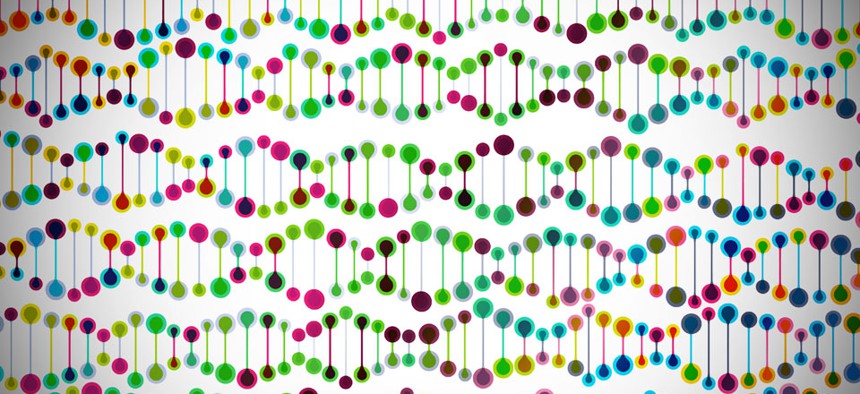When Will You Own Your Genetic Information?

Palau/Shutterstock.com
The shuttering of a personal genome kit company raises questions about when access to DNA data will be broadened.
How should the democratization of information brought on by the Internet, new data sources and advances in physical and biological science change the way the government thinks about citizens’ personal data?
That’s one of the questions at the center of the Food and Drug Administration’s move last month to halt the company 23andMe from marketing its $99 personal genetic test kits, which promise to offer information on more than 240 “health conditions and traits.”
The FDA claimed 23andMe was essentially marketing medical devices without regulators’ approval. It argued consumers could use information from the saliva tests that was either incorrect or lacked context to make rash decisions about their health such as women undergoing preventive mastectomies if they believe they are at high risk for breast cancer or foregoing some important health regimens if they believe they’re at low risk for a disease.
The FDA’s move has been applauded by many physicians who argue the 23andMe test kits claim a level of predictability that they can’t back up or offer information non-professionals aren’t capable of understanding without a physician’s aid.
This is from a Bloomberg interview with Jeff Murray, president of the American Society of Human Genetics and a pediatrics professor at the University of Iowa:
I have had the test done myself to evaluate what comes out of it. I can say for the most part the information they present does have scientific validity. It’s based on good science and good research. But I’m also, I think, a sophisticated user in that I’m both a geneticist and a pediatrician so I’m able to separate out the small number of tests that I think did have some useful information from a larger number of tests that don’t contribute anything to my healthcare.
Free market advocates, on the other hand, claim the FDA’s move amounts to a nanny state incursion on citizens’ right to gather their own personal information or a government agency protecting a vested interest: doctors who offer genetic testing at a much higher price.
To be clear, I don't have the technical expertise to weigh in on whether 23andMe provides reliable or sufficiently complete genetic information. Nor am I qualified to say how little context is too little when it comes to giving people information about their own bodies and health.
Leaving the specific case of 23andMe aside, however, it seems clear that the trend across disciplines is for new methods of gathering and distributing data to lead to a broadening of the people who can access and control that data.
Take journalism as an example. While journalism was never a licensed industry in the manner of medicine or law, the power to collect and widely distribute news was once pretty tightly held by a select group of print reporters, editors and broadcasters simply because they controlled the presses and the airwaves. With the development of the Internet, social media and digital photography that power was essentially broadened to anyone with a smartphone or an Internet connection.
The results have been mixed but generally positive. There’s much more misinformation out there now -- and more misinformation being corrected and called out, to be sure -- but that hardly outweighs the value to citizens and to history of millions of new information disseminators, quite a few of whom are in places traditional media can’t or doesn’t go, from the streets of Syria to the slums of Chicago to rural communities across the U.S. and the world.
There are dozens of other examples. Google and TurboTax have made it vastly easier to file your own income taxes without help from an accountant. Zillow has made it easier to find a home without a real estate agent. Craigslist broke the stranglehold of paid classified ads.
The current U.S. model for most personal health information is that it must be filtered through a trained and licensed doctor before it can reach patients’ ears. If other industries are any guide, this stranglehold is likely to loosen in the coming years or decades.
Will this lead to people making more medical decisions with incomplete information? Quite likely -- just as they do now when they rely on shoddy or biased news sources before casting votes or choosing which diet to go on. But that seems to be the great trade off of the digital world: More personal freedom brings more personal responsibility.
One final note: Data collected by companies like 23andMe could one day be a great supplement to clinically-gathered genetic information if consumers are properly notified and the data is sufficiently anonymized. As we transition from a paradigm in which data is typically created and then studied to one in which data is more often culled from existing sources, the government should be on the lookout for these sorts of nascent data sources and consider the future benefits they may provide to researchers and citizens.
(Image via Palau/Shutterstock.com)
NEXT STORY: Drone-Delivery Expert on Amazon's Plans






